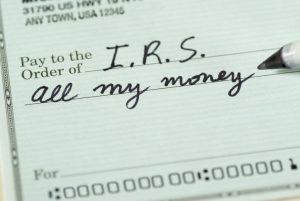Many people who are considering Chapter 13 bankruptcy have questions about what happens to their IRS debt. They wonder if their back taxes can be wiped out via bankruptcy. As you may expect, this isn’t a question with a yes or no answer. Read on to learn more about the complexities of this situation and then reach out to The Law Offices of Paul Y. Lee at 951-755-1000 for a free bankruptcy consultation.
Several factors determine whether or not tax debt can be included in a bankruptcy
In some instances, tax debt may be dischargeable via a bankruptcy. There a number of deciding factors, including the type of tax you owe, what caused the debt to rise, how old the tax is, and when the tax was assessed. If the debt meets specific criteria, which we’ll explain below, then it could potentially be dischargeable in both Chapter 13 and Chapter 7 bankruptcy.
What does it mean if a debt is “discharged”?
If a debt is able to be discharged, that means that you will no longer owe the debt after your case is discharged by the bankruptcy court. In the case of tax debt, it means that the IRS won’t be able to come after you to collect the debt after the bankruptcy is discharged. This is due to the fact that the rulings of bankruptcy courts supersede decisions made by tax authorities.
Only one type of tax debt is dischargeable
Tax debt may be dischargeable but debts that arise from other type of tax obligations are generally priority non-dischargeable debts. One example is payroll taxes. These priority debts take precedence in bankruptcy cases, even when it’s not secured by collateral. If you file Chapter 13, then you’ll be expected to pay priority debts in full by making monthly payments.
When it comes to federal income tax, it may be dischargeable if it meets a number of requirements. The taxpayer may not have committed a tax crime, such as tax fraud or tax evasion. If the court determines that fraud was in play, then they may dismiss the bankruptcy case and begin a criminal case. The debtor must have filed tax returns for two years before they filed bankruptcy. There are special rules that apply to late returns. Finally, the tax return the debtor wants to discharge must be at least three years older on the bankruptcy filing date.
Do you need help with debt? Call us for help!
If you’re in debt and don’t know what to do about it, then we have good news for you. Bankruptcy may or may not be the best choice for you but you can find out with no risk. Just call The Law Offices of Paul Y. Lee at 951-755-1000 and request a free bankruptcy evaluation. You can count on us to provide honest, forthcoming advice so that you have all the information before you make a decision. Call us today to get the process started.


